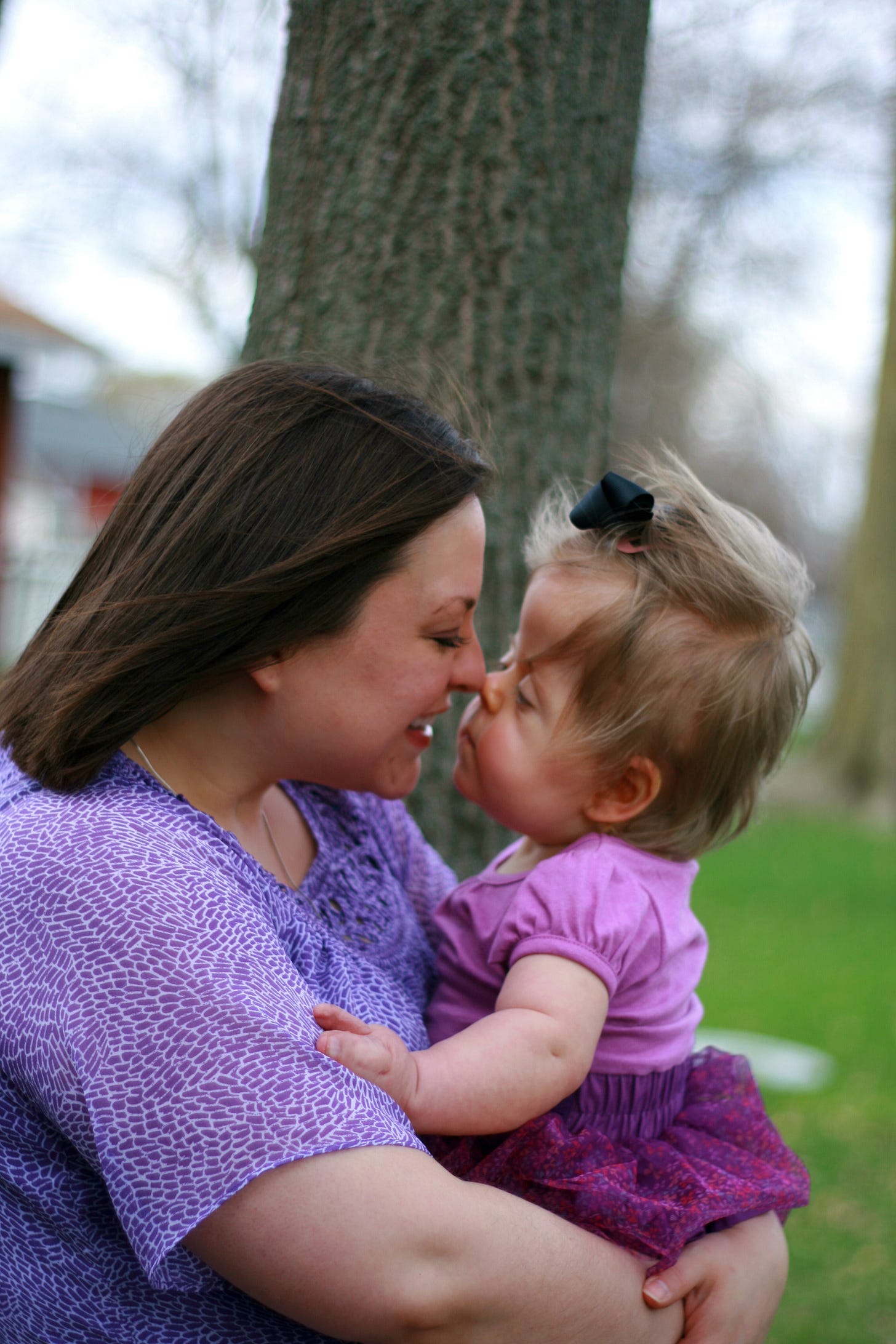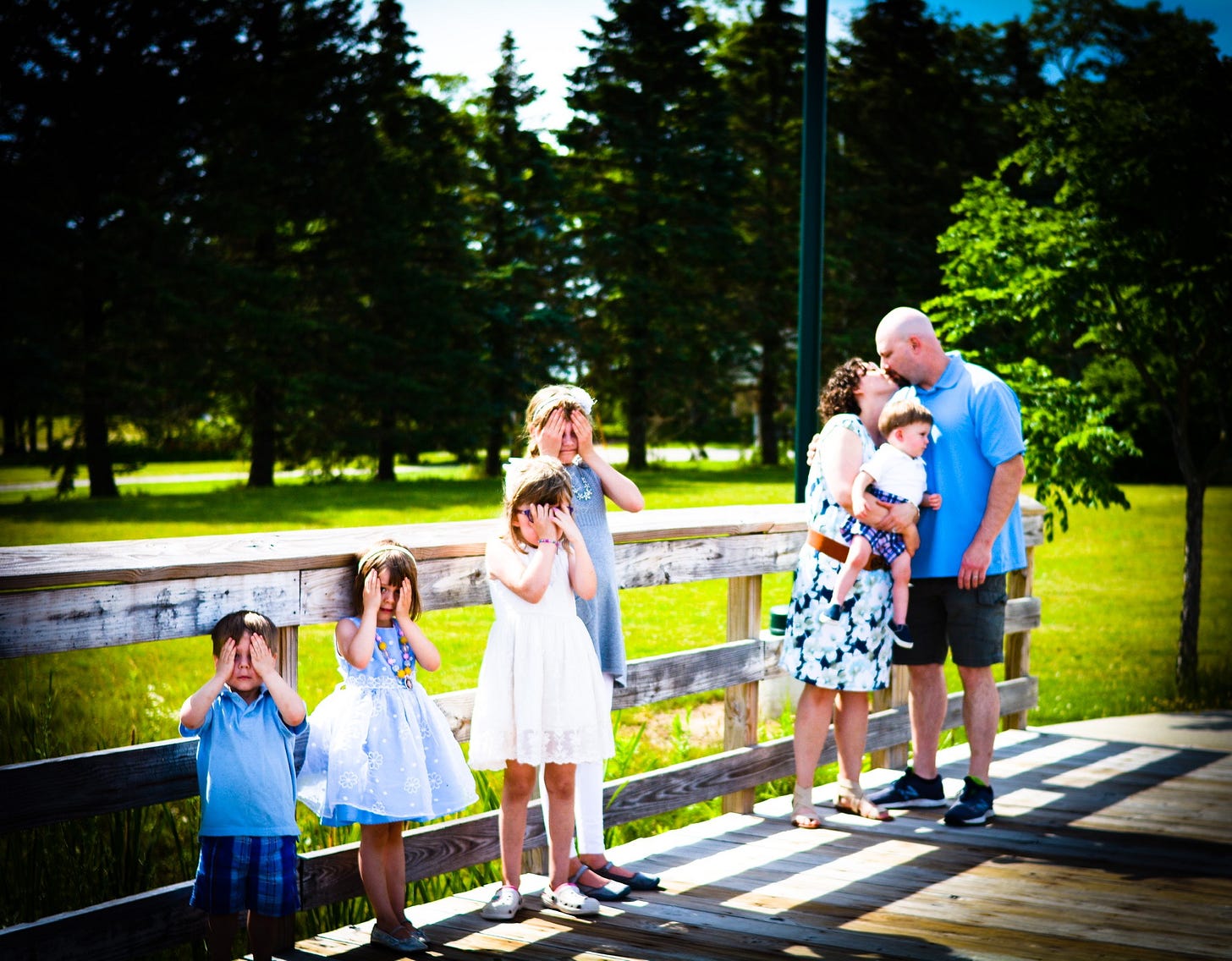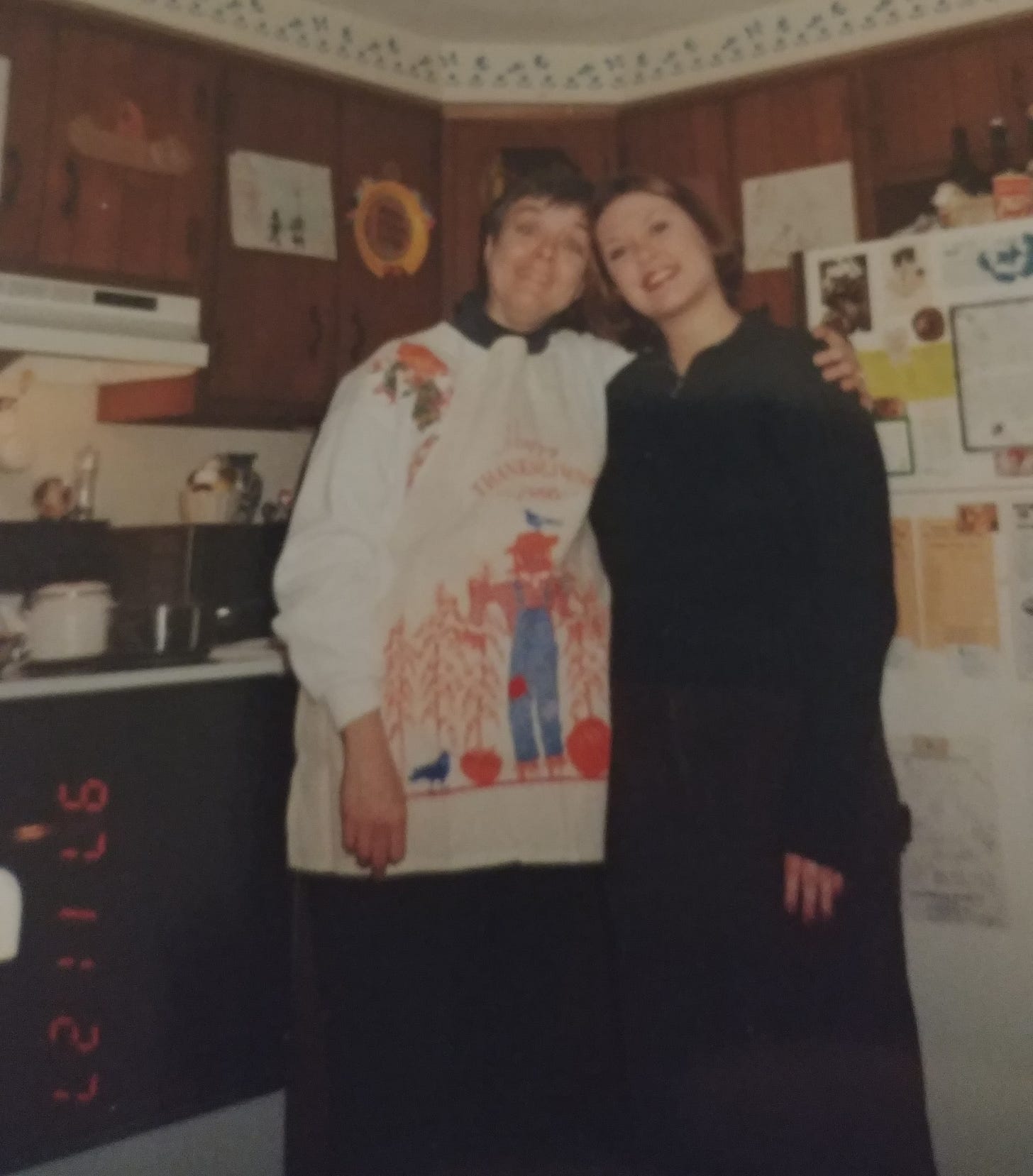You are a mother because you love.
Mother's Day is a time to allow yourself to be both empty and filled.
This is an essay I chose to delete from my memoir. You can listen to the audio version of this article below:
Motherhood instructs me on how to be fully human, how to embrace the Beast inside me when it howls its raspy cry, when it’s hungry or depleted from the interminable tasks of caring for multiple children with multiple needs. Belle still waits for her return. She still sleeps in my heart. Occasionally, she awakens when I soothe my teething infant, or rock my little one in the hours of night when the world sleeps but I cannot, tears streaming down my cheeks.
I am bone weary.
Love in motherhood means making life a metamorphosis, but also a fusion of all I’ve been through and what still hasn’t happened yet.
I’ve thought about pregnancy a lot these last four years—about what I’ve been through since the beginning of it all, before I conceived Felicity, but also about what other women have been through. Fertility is a long, lonely road sometimes.
Here’s what I know: Pregnancy is not a disease. The fetus is not a parasite. (A friend once told me she felt like her baby in utero was a parasite sucking the life out of her. Noted.) When every aspect of pregnancy happens as it was designed to, a healthy baby will enter the world, and the woman who birthed the baby will be healthy, too.
Of course, there are always anomalies, because when one or more human bodies are involved, we must expect the unexpected, even the improbable or the worst.
Sometimes a woman cannot conceive. (This was me fourteen years ago.) Sometimes she will conceive but miscarry. (Also me, but dozens of other women I’ve known through the years, as well.) Sometimes she will have no trouble conceiving or carrying the baby to full term, but the infant will be stillborn or have a mix-up with its genetic material that results in the absence of a finger or brain or any number of parts.
Sometimes the baby has an extra chromosome, rather than a deficit. There are babies with cleft lips and palates, some with rare conditions parents have never heard of—like Apert syndrome, when Ben and I first learned of it eleven years ago when Sarah was born. And sometimes every condition is perfect, no flukes at all—conception, pregnancy, the health of the mother and child—but something terrible goes awry during childbirth. And the baby might not make it. The mother might die. Or both.

There exist so many possible scenarios for the trajectory of fertility: from the decision to become a mother until the fetus crosses the birth canal and, at long last, makes its entry into the world. So many. So, so many.
I have heard stories, both breathtaking and heartrending. I have experienced my own. There can be trauma. There can be tears, sometimes of grief, sometimes of joy, but almost always of both. What is supposed to happen in pregnancy almost never does, unless you happen to be a rare phenom who sails through every step and stage without complication. (If this is you, I’m relieved and grateful.)
When complications happen in both life and death, or when we participate in the brevity of our child’s life, only to be forced by an unseen hand into the terrain of death, no one and nothing can prepare us for what to expect or how to feel or what to do. Nothing consoles, not prayers or positive thoughts or cards or flowers or meals or gifts.
Because you had a human living inside of you. Or at least you might have, or could have, if only your body would have cooperated. You tried to conceive; you attempted many avenues for the baby you held only in your dreams—expensive, painful avenues that led you on a long, arduous path to nowhere. (The story of infertility.)
Maybe you finally see the positive pregnancy test after the time, money, failed fertility treatments, and despondency, but at that first ultrasound, there is no movement, no heartbeat. And you know. You see it in the tech’s eyes. You hear it in the silence as the tech moves the Doppler inside and out. No conversation, only stony silence. Absence of mirth equals absence of life. Then, the only words she speaks to you are at the fortunate end of this torturous appointment, when the tech doesn’t make eye contact but quietly tells you, “The doctor will be in shortly to talk to you.”
You want to run, to scream, but you don’t. You do what you must in order to maintain your composure in this public arena, but all you can think is, I just saw the positive test. The double lines. I just saw them. The baby was there. I wanted her. I loved her. Except now, in this hollow place you find yourself in, you know you didn’t get to really see your baby. You couldn’t. You weren’t given the chance. And you want to be anywhere but here. Still, you wait until you hear the doctor prove what you already know but desperately want to believe is wrong somehow: “There is no heartbeat. I’m sorry.”
You nod. You slowly dress as the door closes behind him. You are numb. Your insides churn. What’s next? Do you go about your day? Do you try again for another baby? When? How do you break the news to the few who knew there was finally a baby on the way?
But you do none of these, because there are no words or emotions or expressions to describe how your body, your heart, just contained both life and death. You carried both inside of you—life and death. You became the life that grew in your womb. And then you became the death, the absence, the loss. You felt the exuberance of someday holding and nurturing a person who shares your blood, your genetic history, maybe your eyes or nose or laugh. But you feel the crash, too, of that life, that light, slipping away into extinction. (The story of miscarriage.)
Both light and darkness are heavy millstones to lug. And you feel accountable for this little person’s life and death. You finally knew joy, but you didn’t realize until now that you never really understood what grief was: a conglomeration of sadness and anticipation with every change and developmental milestone of your child’s growth—and of yours, as well.
This is what motherhood has taught me: that in being both a mother and a daughter, there is pain. The pain of what has been but is no longer. The pain of what might have or could have been but never was. The pain of an evolving relationship that cycles through thorny setbacks and misunderstandings, and shared triumphs and connection.

We are all mothers, and we are all daughters.
You are a mother, because you have a maternal heart. You are a mother when you reach out to the lost and wounded around you, when you listen with attention to a lonely friend, when you bring soup and a handwritten note to a neighbor who just lost her husband. Your hugs, the way you minister to a friend—these are healing balms that soothe the inner wounds of those around you.
You are a mother, because you love.
Love isn’t exclusive to giving birth to another human who shares your likeness. It’s giving birth in all the metaphorical ways we women do: in hugs and smiles, in tears and time, over a cup of tea or through an uplifting text. We love when we step outside of ourselves and into the heart of another.
There is no cure for emotional anguish, or suffering, or loss. But there is care. And care means all the ways you know how to love.
Mother’s Day is complicated, because our relationships are fraught with the problems that don’t have solutions and the questions that have no answers. You can love your mom fiercely, yet have no contact with her. And you can be a mother with no visible, live children. Mothers give birth, and mothers shed blood. If anyone knows the definition of sacrifice, it is the woman with a maternal heart.
So extend your palms to the sky today, and with me, open them to hold both your loss and your love. Keep them there, side by side, holding hands inside your own, until you are ready to release them once again.
You can be both empty and filled at the same time.






Thank you for sharing this with me. It's tender.
Every year, in the weeks before Mother's Day, I grieve the mothering I wasn't able to do in my life...being pregnant. giving birth. being a mother to a child of my own. I feel the aches of emptiness in my body. What wasn't. What couldn't be. What didn't happen. It's a strange feeling, to *know* what it would feel like even though I've never felt it.
And then, on Mother's Day, I put away my grief and celebrate the women in my life who did have this honor and privilege.
This piece was truly inspired. Thank you for saying things that need to be said. As a woman who never had any children per se, I appreciated the part about miscarriage as well as all women being mothers in our society. I have had my experiences of being a mother in many different ways although others don’t see this as important. Thank you!